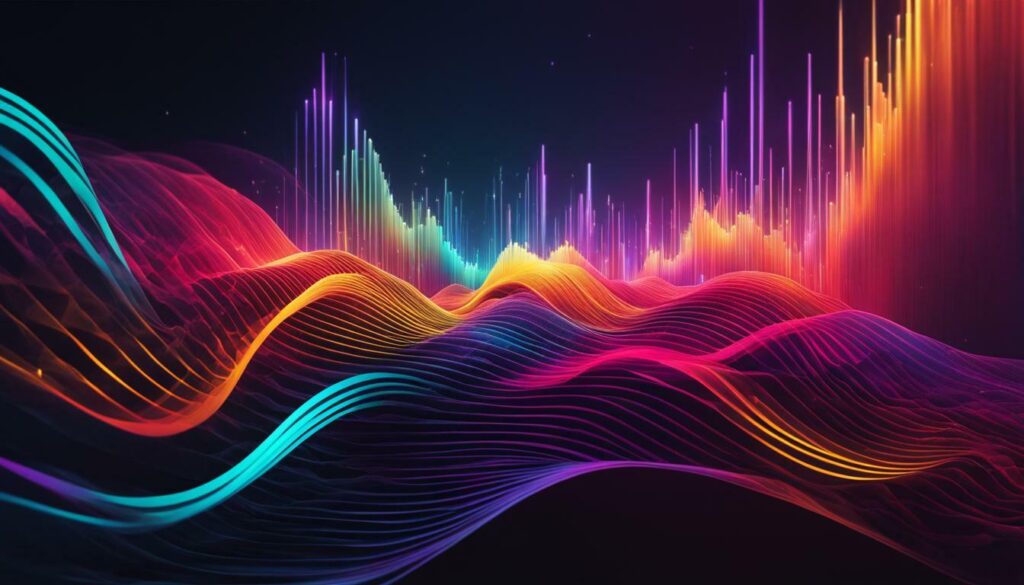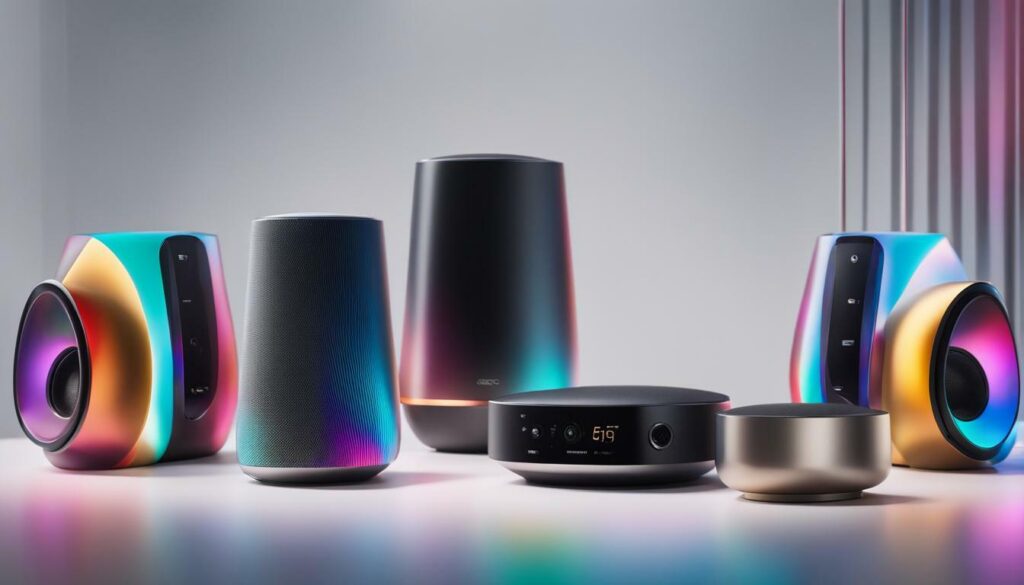From Soundwaves to Cash Flow: How AI Audio Can Boost Your Earnings

Welcome to the fascinating world of AI audio, where artificial intelligence meets audio technology to create advanced audio systems and capabilities. AI audio involves the application of machine learning algorithms and natural language processing techniques to audio data, enabling intelligent audio analysis, speech recognition and synthesis, and more.
Artificial Intelligence audio systems can process massive amounts of audio data at a quick pace, extracting meaningful information and insights that can be leveraged for various applications. They have the ability to recognize and understand human speech, distinguish different audio signals, and filter out background noise, among other things.
As AI audio technology continues to evolve, it is becoming an essential component of modern businesses that want to stay competitive and innovative. In this article, we’ll take a deep dive into the world of Artificial Intelligence audio, exploring its many facets and the value it can provide for businesses. Keep reading to learn more!
Table of Contents
Harnessing Voice Recognition Technology for Business Success
Voice recognition technology is a game-changing tool that is rapidly transforming the way businesses interact with their customers. With artificial intelligence (AI) and natural language processing (NLP) at its core, voice recognition technology can analyze, understand and interpret human speech with remarkable accuracy.
By integrating AI audio technology, businesses can unlock a host of benefits, including enhanced customer experiences, streamlined processes and new revenue streams. Voice recognition technology can improve accessibility for customers with disabilities and increase efficiency by automating tasks that traditionally require human intervention, such as booking appointments and placing orders.
Moreover, with the rise of digital assistants such as Siri and Alexa, voice recognition technology has become an integral part of consumers’ daily lives. Businesses that adopt voice recognition technology can capitalize on this trend by creating their voice-enabled applications, providing customers with a seamless, personalized experience.
In conclusion, leveraging voice recognition technology through AI audio offers immense potential for businesses seeking to boost their earnings and stay ahead of the competition. Stay tuned to learn more about the role of natural language processing in driving AI audio innovation.

How Natural Language Processing Drives Audio Innovation
One of the most exciting capabilities of AI audio technology is its ability to understand and interpret human language, thanks to the implementation of natural language processing (NLP) algorithms. NLP is a subfield of AI that focuses on enabling machines to process and interpret human language through speech or text inputs. By applying NLP to audio, AI systems can analyze, recognize, and respond to spoken words, facilitating intelligent audio interactions and analysis.
Speech recognition, which involves converting spoken language into text, is one of the most common NLP applications in AI audio. Speech recognition algorithms analyze audio signals, identify phonemes and words, and map them to a written script. This can be further enhanced by machine learning, which allows the system to learn from a vast amount of voice data to improve recognition accuracy over time.
Another key NLP application in AI audio is sentiment analysis. By analyzing the tone, inflection, and context of spoken language, AI systems can uncover the emotions and attitudes expressed in audio data. This can be particularly useful in analyzing customer feedback, identifying key issues, and improving customer experience.
NLP algorithms can also be used in language translation, allowing for real-time audio translation between languages. This can improve accessibility and communication, enabling people who speak different languages to interact with each other more seamlessly.
As NLP technology continues to advance, the possibilities for its application in AI audio are endless. With the combination of NLP, machine learning, and other advanced algorithms, AI audio has the potential to revolutionize the way we interact with audio data and unlock new opportunities for businesses.

Enhancing Audio with Advanced Algorithms
Audio algorithms are at the core of AI audio technology, enabling machines to analyze and manipulate audio data with exceptional precision and accuracy. These algorithms form the backbone of AI audio systems, providing the advanced capabilities needed for speech recognition, sound synthesis, noise reduction, and more.
One of the key advantages of audio algorithms is their ability to enhance sound quality, allowing for clear and crisp audio playback even in noisy environments. These algorithms can also extract meaningful information from audio data, such as identifying individual speakers in a group conversation or detecting specific sounds in a recording.
Audio algorithms are constantly evolving, with new and more sophisticated techniques being developed regularly. This ensures that AI audio technology remains at the cutting edge, providing businesses with the latest tools and capabilities to improve their operations and enhance customer experiences.

“Audio algorithms are at the core of AI audio technology, enabling machines to analyze and manipulate audio data with exceptional precision and accuracy.”
The Art and Science of Speech Synthesis
Speech synthesis is the process of producing artificial human speech. In AI audio, speech synthesis plays a crucial role in delivering a natural and pleasant auditory experience to users.
One technique used in speech synthesis is concatenative synthesis, where pre-recorded speech segments are spliced together to form complete sentences. Another technique is parametric synthesis, where the speech is generated based on a set of mathematical parameters.
A more advanced technique is neural TTS, or neural text-to-speech, which uses deep neural networks to generate speech that sounds indistinguishable from human speech. This technology has revolutionized the field of speech synthesis and has enabled the creation of more realistic and natural-sounding speech in AI audio.

The applications of speech synthesis in AI audio are vast. Virtual assistants such as Siri and Alexa utilize speech synthesis to provide users with audible responses to their queries. Audiobooks and podcasts use speech synthesis to deliver engaging and immersive audio experiences to listeners.
However, the use of speech synthesis in AI audio is not without its challenges. One of the main challenges is to ensure that the generated speech is easily understandable and free of any errors or artifacts that may detract from the listening experience.
As speech synthesis technology continues to advance, it will play an increasingly integral role in AI audio applications. From improving the accessibility of audio content to facilitating more engaging and interactive user experiences, speech synthesis is poised to revolutionize the way we interact with and experience audio in the digital age.
The Rise of Voice Assistants in Audio
Voice assistants have quickly become a ubiquitous presence in the world of AI audio. These intelligent virtual assistants leverage natural language processing to understand and interpret human speech, enabling users to interact with devices and perform various tasks through voice commands.
For businesses, voice assistants offer a range of benefits, from enhancing customer experiences to improving operational efficiency. By incorporating voice assistants into their ecosystem, companies can automate repetitive tasks, provide responsive customer support, and deliver personalized recommendations based on user preferences.
However, integrating voice assistants into your business requires careful planning and consideration. As with any new technology, there are potential challenges to overcome, from ensuring data security to managing user privacy concerns.
Nonetheless, with the continued growth and development of AI audio technology, the rise of voice assistants presents a significant opportunity for businesses to stay ahead of the curve and capitalize on the latest advances in artificial intelligence.

Leveraging Machine Learning for Audio Analysis
Machine learning algorithms are revolutionizing the way audio data is analyzed. By leveraging these advanced algorithms, businesses can gain unprecedented insights into customer behavior, sentiment, and preferences.
Machine learning audio can be used for a variety of purposes, from voice biometrics to sound recognition. Sentiment analysis is one of the most popular applications of machine learning in audio analysis. It involves using machine learning algorithms to analyze audio data and determine the emotions and attitudes expressed by the speaker. This can be incredibly valuable for businesses looking to understand customer sentiment and improve their products and services accordingly.
Voice biometrics is another emerging application of machine learning audio. This involves using machine learning algorithms to analyze the unique characteristics of a person’s voice, which can then be used to verify their identity. This can be particularly useful for businesses in industries such as finance and healthcare, where security is of the utmost importance.
Sound recognition is yet another application of machine learning audio. This involves training machine learning algorithms to recognize specific sounds or patterns in audio data. For example, a business might use machine learning audio to recognize the sound of a particular machine or the voice of a specific customer service agent. This can help businesses automate processes, improve efficiency, and provide better customer experiences.
Overall, machine learning audio has the potential to transform the way businesses operate and interact with their customers. By leveraging the power of machine learning algorithms, businesses can unlock unprecedented insights into customer behavior and preferences, and use this information to improve their products, services, and operations.

The Power of Audio Data Analysis in Business
As Artificial Intelligence audio technology advances, so too does the ability to analyze audio data for business insights. Audio data analysis refers to the process of extracting meaningful information from audio recordings, which can provide valuable insights into customer preferences, behaviors, and sentiment.
By leveraging AI algorithms, businesses can analyze audio data at scale, identifying trends and patterns that would be difficult for humans to detect. This can lead to better customer understanding and more informed decision-making.
One application of audio data analysis is sentiment analysis, which involves using machine learning algorithms to classify the emotional tone of audio recordings. By analyzing customer interactions, businesses can gain insights into how customers feel about their products or services and identify areas for improvement.
Another application is voice biometrics, where machine learning is used to identify individuals based on their unique voice patterns. This technology can be used to enhance security measures, such as verifying customer identities over the phone.
Finally, machine learning can also be used to recognize and classify sounds, such as identifying the type of equipment being used in a manufacturing plant or detecting anomalies in an audio stream.

By leveraging the power of audio data analysis, businesses can gain valuable insights into customer behavior, preferences, and sentiment. This can lead to improved customer experiences, better decision-making, and ultimately, increased revenue.
Applications in Marketing and Advertising
Artificial Intelligence audio technology has transformed the way businesses approach marketing and advertising. With the rise of voice search, businesses need to optimize their content to rank higher in voice search results. This means focusing on long-tail keywords and creating content that is conversational and easy to understand.
Another application of AI audio in marketing and advertising is the use of voice assistants for targeted advertising. By analyzing user data and preferences, Artificial Intelligence audio technology can deliver personalized advertisements to customers based on their interests and preferences. This not only improves the effectiveness of advertising campaigns but also enhances the overall customer experience.
Opportunities for Content Creators
Artificial Intelligence audio technology has opened up new opportunities for content creators to monetize their work. For instance, podcasters can use AI audio algorithms to transcribe their episodes, making them searchable and accessible to a wider audience. This can lead to increased ad revenue and sponsorship opportunities.
Furthermore, Artificial Intelligence audio technology allows content creators to create voice avatars that can narrate their written content. This not only adds a personal touch to the content but also opens up new revenue streams, such as audiobook narrations and voiceover work.

Implementing in E-commerce
AI audio technology has the potential to revolutionize the way e-commerce businesses operate. By integrating AI-powered voice assistants into their platforms, businesses can provide a more personalized and interactive shopping experience for their customers. For example, customers can use voice commands to search for products, add items to their cart, and complete the checkout process.
Moreover, AI audio technology can be used to enhance product recommendations. By analyzing customer data and preferences, AI algorithms can suggest relevant products to customers, increasing the chances of upselling and cross-selling.
Integrating into Customer Service
AI audio technology is transforming the way businesses approach customer service. By using AI-powered voice assistants, businesses can provide real-time assistance and support to their customers. For instance, customers can use voice commands to get answers to their queries, track their orders, or initiate returns and exchanges.
Artificial Intelligence audio technology can also be used to automate customer service processes, such as call routing and appointment scheduling. This not only reduces wait times but also improves the overall efficiency of customer service operations.

Data Analytics: Leveraging Insights for Business Growth
AI audio technology provides businesses with valuable insights that can be leveraged for business growth. By analyzing audio data, businesses can gain a deeper understanding of customer preferences, sentiments, and behaviors. This information can be used to tailor marketing strategies, improve product offerings, and enhance customer experiences.
Furthermore, Artificial Intelligence audio technology can be used to analyze customer interactions and identify patterns and trends. This can help businesses identify areas for improvement, optimize workflows, and make data-driven decisions.
Challenges and Considerations in Adopting AI Audio Technology
While Artificial Intelligence audio technology offers numerous benefits, there are also challenges and considerations that businesses need to take into account. One challenge is the need for high-quality audio data. AI audio algorithms require clean and accurate audio data to perform optimally. Businesses need to ensure that their audio data is of high quality and free from noise, distortion, and other artifacts.
Another consideration is privacy and security. Artificial Intelligence audio technology involves processing and analyzing audio data, which may contain sensitive information. Businesses need to implement robust security measures to protect customer data and comply with data protection regulations.
When implementing AI audio solutions, businesses must consider several factors. These include:
- Compatibility with existing technology and systems
- Data privacy and security concerns
- Cost-effectiveness and return on investment
- Impact on employees and workflow
- Potential ethical considerations
By carefully considering these factors and working with experienced Artificial Intelligence audio professionals, businesses can successfully implement and leverage the power of AI audio technology.
Future trends and Potential for Revenue Generation
The future of AI audio holds immense potential for revenue generation. As AI audio technology continues to advance, we can expect to see more innovative applications and opportunities for businesses to monetize their audio content.
One future trend is the use of AI audio for immersive audio experiences. With the rise of virtual reality and augmented reality technologies, businesses can use AI audio algorithms to create realistic and immersive audio environments, enhancing the overall user experience.
Another future trend is the integration of AI audio with other emerging technologies, such as blockchain and Internet of Things (IoT). This opens up new possibilities for businesses to create innovative and interactive audio experiences, such as personalized audio tours and interactive audio advertisements.
Navigating the Path Ahead
As Artificial Intelligence audio technology continues to evolve and revolutionize the way we interact with audio, businesses must prepare to navigate the path ahead. The potential benefits of AI audio are vast, from improving customer experiences to unlocking new revenue streams. However, there are also potential challenges to consider, such as ethical and privacy concerns.
To successfully navigate this path, businesses must stay informed and up-to-date on the latest developments in AI audio technology. This includes understanding the potential applications and benefits of AI audio, as well as the limitations and challenges.
The Future of Artificial Intelligence Audio
The future of AI audio is bright, with endless possibilities for businesses to improve processes, enhance customer experiences, and drive revenue growth. As technology continues to evolve, AI audio will become even more advanced and sophisticated, with new applications and capabilities emerging.
To stay ahead of the curve, businesses must adapt and embrace Artificial Intelligence audio technology. Those who do will be well-positioned to reap the benefits and gain a competitive advantage.
As you navigate the path ahead, remember the potential of AI audio and the importance of staying informed, adaptable, and open to innovation.
Wrapping Up
AI audio is poised to revolutionize the business landscape, with its ability to enhance customer experiences, automate processes, and unlock new revenue streams. As the technology continues to evolve, it is critical for businesses to embrace AI audio solutions to stay ahead of the curve and capitalize on its benefits.
This article has explored the various facets of Artificial Intelligence audio, from voice recognition technology to natural language processing, advanced algorithms, and speech synthesis. We have also discussed the growing popularity of voice assistants and the potential of machine learning audio for audio analysis.
Looking ahead, there are endless possibilities for Artificial Intelligence audio technology, and businesses must navigate the path ahead carefully. While there are potential challenges in implementing AI audio solutions, the benefits are too significant to ignore. By leveraging the power of AI audio, businesses can optimize operations, enhance customer understanding, and drive data-driven decision-making.
FAQ
What is AI audio?
Artificial Intelligence (AI) audio refers to the use of advanced algorithms and machine learning techniques to process and analyze audio data. This technology enables computers and devices to recognize, understand, and manipulate audio in various ways. AI audio systems can perform tasks such as speech recognition, transcription, speaker identification, and even generate realistic human-like voices. With Artificial Intelligence audio, machines can understand and interact with audio content to provide a wide range of applications and benefits.
How does AI audio work?
AI audio works by leveraging deep learning algorithms and neural networks to process vast amounts of audio data. The process typically involves several stages:
- Audio Input: The system receives audio signals, either in real-time or from recorded sources.
- Preprocessing: The audio data goes through preprocessing, such as noise reduction, filtering, and normalization.
- Feature Extraction: Relevant features, such as frequency patterns, spectrograms, or waveforms, are extracted from the audio.
- Neural Network Training: The extracted features are used to train a neural network model using labeled data, enabling the system to learn patterns and make predictions.
- Inference: Once the model is trained, it can be used for various tasks such as speech recognition, transcription, or synthesis.
What are the applications of AI audio?
Artificial Intelligence audio has numerous applications across various industries, including:
- Speech recognition and transcription: AI audio enables accurate conversion of spoken language into written text, benefiting fields such as transcription services, call center automation, and accessibility for the hearing impaired.
- Voice assistants: AI audio powers voice assistants like Siri, Alexa, and Google Assistant, allowing users to interact with devices using voice commands.
- Music and sound analysis: AI audio can analyze music tracks, identify genres, classify instruments, and even generate coherent music compositions.
- Noise cancellation: AI audio technology can detect and suppress background noise, resulting in improved call quality and audio recordings.
- Audio search and recommendation: AI audio can analyze audio content and provide relevant recommendations, enhancing user experience in platforms like podcasts or music streaming services.
- Voice cloning and synthesis: AI audio can mimic voices, generating human-like speech for various applications, including audiobooks, voiceovers, and personalized voice interfaces.
Can AI audio be used for language translation?
Yes, AI audio can be used for language translation. With advancements in neural machine translation (NMT) and natural language processing (NLP) techniques, Artificial Intelligence audio systems can translate spoken language in real-time. Users can communicate through voice in one language, and the AI audio system can accurately transcribe, translate, and even generate speech outputs in the desired target language.
How accurate is AI audio transcription?
AI audio transcription accuracy is continually improving. With advancements in deep learning and neural networks, Artificial Intelligence audio systems have achieved high levels of accuracy in transcription tasks. However, the accuracy can still vary depending on factors such as audio quality, background noise, accents, and speech complexity. In ideal conditions, state-of-the-art AI transcription systems can achieve accuracy rates close to human-level performance.
Is AI audio capable of emotion recognition?
Yes, Artificial Intelligence audio can recognize and analyze emotions portrayed in audio, such as speech or music. By extracting features from audio signals related to pitch, intensity, and timing, AI models can classify and detect various emotions like happiness, sadness, anger, or surprise. Emotion recognition in audio can have applications in fields such as sentiment analysis, market research, and personalized recommendations.
Can AI audio be used for voice cloning?
Yes, Artificial Intelligence audio technology enables voice cloning, also known as voice synthesis or voice conversion. By training models using large audio datasets of a specific voice, AI can generate speech that sounds remarkably similar to the target voice. Voice cloning has practical applications in personalized voice assistants, audiobook narration, dubbing, and creating realistic voice avatars.
What are the privacy concerns related to AI audio?
The increasing capabilities of AI audio raise privacy concerns related to voice data and potential misuse. Some of the main concerns include:
- Unauthorized voice recording and misuse of sensitive information.
- The potential for voice manipulation or deepfakes for malicious purposes.
- Profiling individuals based on voice characteristics.
- Unwanted surveillance or intrusive voice analysis.
To address these concerns, data anonymization techniques, secure storage, transparent data usage policies, and user consent mechanisms are necessary.
How can AI audio enhance user experience in apps and devices?
AI audio enhances user experience in apps and devices by providing:
- Voice-controlled interfaces: AI audio allows users to interact with devices and apps naturally, using voice commands instead of complex user interfaces.
- Accurate transcription and voice search: AI audio enables seamless content discovery, easier note-taking, and improved accessibility for hearing-impaired users.
- Personalized recommendations: Artificial Intelligence audio can analyze user preferences based on audio content consumption, making accurate recommendations for music, podcasts, and other audio-based media.
- Noise reduction and enhancement: AI audio algorithms can suppress background noise, improve call quality, and enhance audio clarity, leading to better user experiences in communication apps or devices.
Is AI audio technology accessible to everyone?
AI audio technology is becoming increasingly accessible to developers and users. Many frameworks, APIs, and tools are available that provide pre-trained models and APIs for speech recognition, transcription, and voice synthesis. This accessibility allows developers to integrate AI audio capabilities into their applications and devices without extensive knowledge of the underlying algorithms. However, further advancements and awareness are necessary to ensure equal accessibility and avoid potential biases or limitations in AI audio technology.
How can voice recognition technology benefit businesses?
Voice recognition technology has the potential to revolutionize businesses by enhancing customer experiences, automating processes, improving accessibility, and unlocking new revenue streams.
What is the role of natural language processing in AI audio applications?
Natural language processing enables machines to understand and interpret human language, driving intelligent audio interactions and analysis within AI audio systems.
How do audio algorithms enhance AI audio capabilities?
Audio algorithms can improve sound quality, eliminate noise, extract meaningful information, and overall enhance the audio experience within AI audio systems.
What is speech synthesis and how does it contribute to AI audio?
Speech synthesis is the generation of human-like voices by Artificial Intelligence audio systems. It enables applications such as virtual assistants and audiobooks.
What is the impact of voice assistants on AI audio?
Voice assistants are becoming increasingly popular and are shaping the Artificial Intelligence audio landscape. They offer functionality, benefits, and challenges when integrated into business ecosystems.
How does machine learning contribute to audio analysis within AI audio?
Machine learning algorithms can analyze audio data to uncover patterns, trends, and insights. This technology has applications in sentiment analysis, voice biometrics, and sound recognition.
How can audio data analysis benefit businesses?
Analyzing audio data can provide valuable insights for businesses, enhancing customer understanding, optimizing operations, and driving data-driven decision-making.
What are the future possibilities of AI audio technology?
The future of Artificial Intelligence audio presents exciting opportunities for businesses. However, it also comes with challenges and considerations in implementation and staying ahead in a rapidly evolving landscape.
What key takeaways should we remember about AI audio?
In summary, Artificial Intelligence audio has the potential to boost business earnings. It is crucial to embrace this technology and stay ahead of the curve to capitalize on its benefits.
